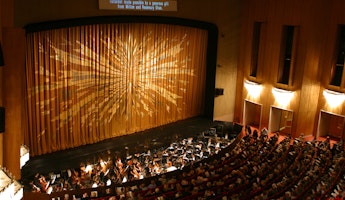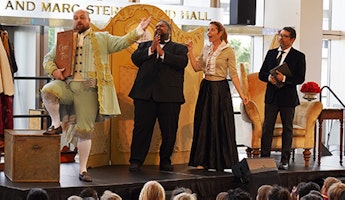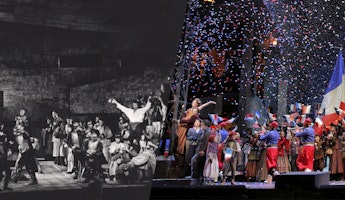Blog
June 25, 2023
A Brief History of Queer Opera
When thinking about great opera composers, names like Verdi, Mozart and Puccini spring to mind. While those peerless composers contributed countless masterpieces to the opera world, they represent only part of the incredible array of composers in the genre. At LA Opera, we believe in celebrating the works of all opera composers. During Pride month, we want to look at some queer composers whose stories we believe are worth highlighting.
Leonard Bernstein
Birthday: August 25, 1918
Notable works: West Side Story, Candide, Wonderful Town, Mass
Leonard Bernstein—renowned as both a composer and a conductor—was described as a gay man by collaborator Arthur Laurents and by his own wife, actress Felicia Montealegre. When talking about the possibility of Bernstein being bisexual, Laurents said that he was “a gay man who got married. He was not conflicted about his sexual orientation at all. He was just gay.” Laurents himself was a gay, Jewish man—along with Jerome Robbins and Stephen Sondheim—who created West Side Story along with Bernstein. Unlike Laurents and Sondheim, Bernstein kept his sexuality private throughout his life. At that time, it was easier for him to be successful in the classical music world by keeping his sexuality from the public.
As for his private life, Montealegre was aware he was gay before marrying him. She entered the lavender marriage on the condition that as long as he did not embarrass her publicly, he was free to do as he pleased. They raised three children together. In 1976, he went to live with his lover Tom Cothran. The separation did not last long. After Montealegre was diagnosed with lung cancer in 1977, Bernstein moved back to take care of her until her death in 1978. Bernstein then became more open about his sexual activities. Cothran died of AIDS in 1981.
Without his lover and without his wife, Berstein retreated into self-reflection, which had an enormous influence on his 1983 opera, A Quiet Place. The opera explored loss of a loved one and featured a father’s acceptance of his gay son. Bernstein announced his retirement from conducting on October 9, 1990. Five days later, he passed away from a heart attack. Bernstein is widely regarded today as one of the greatest composers of the last century, and fans still visit his grave, where he is buried next to his wife.
For those interested in learning more about Leonard Bernstein and Felicia Montealegre’s relationship, make sure to keep an eye out for the upcoming film Maestro, which stars Bradley Cooper and Carey Mulligan as the complicated couple.
Benjamin Britten
Birthday: November 22, 1913
Notable Works: A Midsummer Night’s Dream, Peter Grimes, Billy Budd and The Turn of the Screw
Unlike Bernstein, Benjamin Britten was more public about his sexuality, ostensibly due to his friendship with queer poet W.H. Auden, who was an artistic mentor to him during Britten's time scoring documentaries in 1935. Two years later, Britten met tenor Peter Pears, and in 1939 they began their romantic relationship.
Britten and Pears lived together openly for the remainder of Britten’s life. Pears even starred in Britten’s first opera, Peter Grimes, which despite drawing homophobic remarks, soon proved to be a critical and commercial success. Britten wrote most of his works with the tenor's voice in mind. In one of Britten’s last works, Death in Venice, he pulled from his own experiences to deal with illness and homosexuality. Britten died in Pears’ arms on December 4, 1976. He declined the honor of being buried at Westminster Abbey so that he could be buried alongside Pears in St. Peter and Paul’s Church.
Ethel Smyth
Birthday: April 22, 1858
Notable Works: The Wreckers, Der Wald, The Boatswain’s Mate
Ethel Smyth was one of the most important composers to popularize opera in the UK and the first woman composer to be awarded damehood. Smyth was a leading member of the women’s suffrage movement in the UK during the early 1900s, even taking time off from composition to join the Women’s Social and Political Union. Smyth’s homosexuality was something she never tried to hide; she had affairs with prominent women of the era, including the suffragette Emmeline Pankhurst.
In fact, Smyth wrote in a letter to her friend and librettist Henry Bennet Brewster; “I wonder why it is so much easier for me to love my own sex passionately rather than yours.” Later in life, Smyth fell in love with English writer Virginia Woolf, and the two were close friends until Woolf’s death in 1941. Ethel Smyth passed away just a few years later on May 8, 1944, at the age of 86. In her later years, she wrote in her diary that people never stop falling in love no matter their age.
Though Smyth did not talk about her sexuality directly in her work, her operas often revolved around lovers who could not be together due to outside interference or people trapped in relationships that they try to escape—reflecting the lived realities of many queer people at the time.
These composers are all presently regarded as giants of classical music, but their personal lives and struggles are often left unexplored. We hope that by shedding light on their sexuality, we can paint a picture of queer history in the opera world—first and foremost, that queer history exists in the opera world. We hope to continue painting that picture in the next blog where we will be looking at some contemporary queer opera composers.








/03-cosi/_dsc0996_pr.jpg?format=auto&fit=crop&w=345&h=200&auto=format)

















